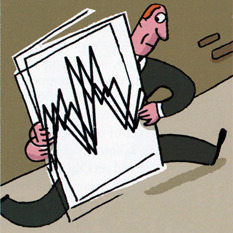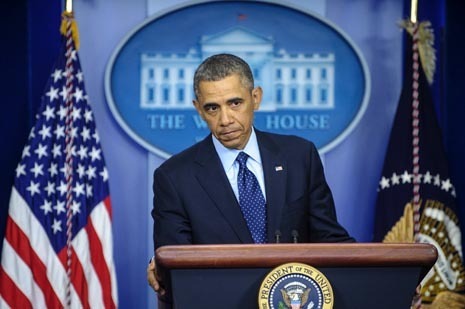John Cassidy's Blog, page 78
March 19, 2013
What’s Wrong With Europe? Cyprus Edition

Another day in the long-running European debt crisis: in Nicosia, an ancient city in the eastern Mediterranean, the Cypriot parliament votes overwhelmingly to reject the terms of a proposed European Union bailout of the country that levied a tax of up to ten per cent on all bank deposits. Out on the streets, thousands of protestors chant, jubilantly, “Cyprus belongs to its people.” Meanwhile, according to Faisal Islam, the economics editor at Britain’s Channel 4 News, the cabs from the local airport have been busy ferrying wealthy Russians who are there trying to get their money out of the Cypriot banks.
No wonder a colleague of mine asked this morning: Why doesn’t Europe work like it did twenty years ago? How come it seems to be in constant crisis these days? The short answer is that, back then, the E.U. was a lot smaller than it is now, and it didn’t have a single currency. In 1993, there were just twelve members of what was then called the European Community, and, except for Greece, all of them were in Western Europe. Today, the E.U. stretches from the Atlantic to the Black Sea, and it contains twenty-seven countries, many of them very different from one another. Seventeen nations share the same currency, the euro, and one of them, unfortunately, is Cyprus.
March 18, 2013
Whither the G.O.P.? A Republican Report Worth Reading

During the mid-nineteenth century, the Tory Party in Britain got a reputation as the stupid party, a moniker that many attribute to John Stuart Mill. (“Although it is not true that all conservatives are stupid people, it is true that most stupid people are conservative.”) It wasn’t so much that the party’s leaders were dumb—Palmerston was a clever fellow, and so was Disraeli—but that the majority of the party, the lumpen aristocracy and its hangers on, appeared to have set its face against the modern world.
Recently, the G.O.P. has been heading in the direction of the Tories. Watching last week’s Conservative Political Action Conference, for example, it was hard to see much evidence of a party coming to terms with the fact that it has lost the popular vote in five out of the last six Presidential elections. The most memorable speech came from Sarah Palin, who suggested that Karl Rove be dispatched back to Texas for having the temerity to call for some of the party’s loonier candidates to be vetted a mite more closely.
...read moreMarch 16, 2013
Will the London Whale Swallow Jamie Dimon?

“I approve.” With the discovery of those two words that Jamie Dimon, the chairman and C.E.O. of JPMorgan Chase, wrote in an email on January 23, 2012, the most prominent banker on Wall Street has been directly tied to the burgeoning “London Whale” trading scandal, which has returned to the headlines in sensational fashion. In a hearing in Washington Friday, the scandal took another twist, with a senior government official asserting that, in the months leading up to the bank losing billions of dollars, Dimon ordered his underlings not to give the bank’s regulators information they had requested.
The escalation in the scandal started with Thursday’s publication of a three-hundred page report by a Senate subcommittee, which said Dimon not only signed off on a strategy that understated the risks being taken by the bank’s traders, including Bruno Iksil, a derivatives trader known as the Whale, who worked out of the bank’s tower at Canary Wharf in east London. After Iksil’s losses were revealed, last April, the report said, Dimon misled investors and the public about their nature.
...read moreMarch 12, 2013
Paul Ryan in Wonderland: Chapter Six

Having wandered back into writing about U.S. politics for the past eighteen months or so, I sometime wonder how the full-time Washington correspondents, the lifers, do it: cover the same old junk year after year. The key to career longevity and job satisfaction, I suppose, is to buy into the notion, assiduously promoted by the politicians and their flaks, that what they are doing is serious. Budgets, national security, energy policy, health policy—these things matter. So get yourself a tape recorder, a Twitter account, and a piece of plastic from the Senate Press Gallery, and hop in a cab up to Capitol Hill. Write down what the elected representatives are saying, and try hard to keep a straight face.
Sorry folks. After watching Representative Paul Ryan launch his much-anticipated budget for the fiscal year 2014, I can’t keep up the pretense. The plan is a joke. It’s dead on arrival, and nobody should pay much attention to it, except as another exhibit in the indictment of latter-day Republicanism. Ryan’s numbers don’t add up. His proposals—cutting domestic programs, converting Medicare to a voucher program, returning Medicaid to the states, reducing the top rate of income tax to twenty-five per cent—were roundly rejected by the voters just five months ago. And the philosophy his plan is based upon—trickle-down economics combined with an unbridled hostility toward government programs designed to correct market failures—is tattered and shopworn.
...read moreMarch 11, 2013
What Killed Intrade?

On Sunday night, Intrade, the online-prediction exchange that became famous during last year’s Presidential election, said that it was closing down forthwith following the discovery of “financial irregularities.” But what were these irregularities? Intrade didn’t say. But citing Irish law—Intrade is legally domiciled in the Emerald Isle—it said that it had been obliged to halt trading on its Web site, close out its customers’ accounts, and “cease all banking transactions for all existing Company accounts immediately.”
Obviously, the big story would be if Intrade, or the authorities, had uncovered efforts to corner one or more of the prediction markets on the electronic exchange, which allowed people to bet on everything from the weather to the Oscars to politics. During the Presidential contest, there were rumors about efforts to manipulate Intrade’s election market, which many journalists, myself included, monitored closely to see how investors and bettors were viewing the chances of Barack Obama and Mitt Romney. For example, after the first debate, in which President Obama did badly, the estimated probability of him being reëlected fell sharply on Intrade—more sharply than could easily be justified on the basis of one off night—prompting some dark mutterings that Romney supporters might have been trying to ramp the market.
March 8, 2013
Whatever Happened to Time Inc.?

Twenty-four years ago this week, I went to the Time & Life Building, at Rockefeller Center, and took the elevator to the wood-panelled thirty-fourth floor. There, I interviewed N. J. (Nick) Nicholas, Jr., who was Time Inc.’s president, and Gerald Levin, who was then Nicholas’s little-known sidekick. A few days earlier, the two of them had agreed to merge the publishing company, co-founded by Henry Luce and Briton Hadden, with Warner Communications, the Hollywood entertainment company that was controlled by Steve Ross, a street-smart New Yorker who made his first fortune operating funeral parlors and parking garages.
At the time, you may recall, Time and other media companies felt besieged. During the previous few years, Rupert Murdoch had bought Harper & Row, his great rival Robert Maxwell had nabbed Macmillan, Bertelsmann had purchased RCA Music, and Sony had acquired CBS Records. “We see Robert Maxwell, Rupert Murdoch, Bertelsmann, and Sony coming into our market and raising hell,” Richard Munro, Time’s chairman, said in announcing the merger. “We see this as an opportunity for an American company to get competitive.” Nicholas expanded upon the same theme. “There will emerge on a worldwide basis, six, seven, eight vertically integrated entertainment conglomerates,” he told me. “At least one will be Japanese, probably two. We think two will be European. There will be a couple of American-led enterprises, and we think Time is going to be one.” Levin backed up his boss: “This is not a transaction done for the purposes of 1989, or even the nineteen-nineties,” he said. “It is for us to be positioned for the next century.”
...read moreAll Politics Aside, Job Figures are Good News

To the victor go the spoils. During last year’s election, President Obama was sometimes said to be desperate not to lose because he couldn’t stomach the thought of Mitt Romney taking credit for a stronger economy. Well, he doesn’t have to worry about that now. And with job growth accelerating and the unemployment rate dropping to 7.7 per cent, its lowest point since December, 2008, things are indeed picking up—and it’s silly for the President’s critics to deny it.
The jobs report for February, which was released this morning, was pretty solid all around—very solid if you consider that the economy had just been hit by an increase in payroll taxes and income taxes on high earners. According to the payroll survey, employers added 236,000 jobs, the highest figure in a year. I always say it’s a mistake to put too much stock in one month’s numbers. But during the past four months, job growth has averaged 205,000, which is a pretty decent number, and one that is high enough to bring down the unemployment rate, albeit gradually.
March 6, 2013
Venezuela’s “Resource Curse” Will Outlive Hugo Chávez

To many people in Latin America, Hugo Chávez was a revolutionary hero who embraced the poor and taunted the Yankees. To others, particularly the landed and the well-to-do, he was the devil—a sobriquet he famously bestowed upon George W. Bush. As far as economists are concerned, Chávez was something else again. On one hand, he was a nutty professor—an increasingly authoritarian one—carrying out a fascinating if unnerving experiment in utopian socialism: grabbing control of Venezuela’s vast oil wealth, using its proceeds to fund social and anti-poverty projects, and expelling the free-market scolds from the I.M.F., the World Bank, and his country’s business establishment. On the other hand, Chávez was a leader dealing with the “resource curse” that has afflicted all too many developing countries.
Rather than generating peace and prosperity, the presence of mineral and oil wealth in countries that have been poor often leads to political conflict, corruption, and, in extreme cases, civil war. While Venezuela remains a very divided country, it didn’t fall to those depths. But with some estimates now showing Venezuela harboring bigger oil reserves than Saudi Arabia, the question of how to manage its immensely valuable natural resources may well cause even more intense conflict in the years ahead.
...read moreMarch 5, 2013
What Saved the Dow? Sensible Economic Policies

As of the closing bell on Tuesday, the Dow was trading at 14,254—well above the previous all-time peak of 14,198, which the market reached on October 11, 2007. With investors increasingly optimistic about the economy, nearly four hundred issues on the New York Stock Exchange hit new highs. Sticklers will point out that, after accounting for inflation, stock prices are still more than ten per cent below their previous peak, but that’s quibbling. Any way you look at it, during the past four years the market has made a remarkable recovery from the post-Lehman crash.
One way to gauge this turnaround is to take a quick historical quiz. How long do you think it took the market to regain its high after the stock-market crash of 1929? Five years? Ten years? Fifteen years? Twenty years? Keep going. On September 3, 1929, the Dow closed at 381.17, a level it didn’t see again until November 23, 1954. That’s twenty-five years, two months, and twenty days—more than a quarter of a century. The stock market’s recuperation from the Great Depression took almost five times as long as its recovery from the Great Recession.
...read moreMarch 1, 2013
Uh-Oh! The Sequester Show Could Go On and On

Well, it happened. The big bad sequester went into effect and guess what? The earth is still rotating on its axis. Planes are still flying, the Coast Guard is still patrolling U.S. waters, and there haven’t been any mass breakouts from federal penitentiaries. On Wall Street, the Dow closed up thirty-five points, leaving it just seventy-five points below its all-time high. Outside of the public sector and the media bubble, I suspect, many Americans greeted the whole thing with a yawn—just more Washington squabbling about the budget.
That’s not really accurate, though. As President Obama pointed out during an extended appearance at the White House press room on Friday, the budget-cutting process that the sequester mandates is “going to hurt. It’s going to hurt individual people, and it’s going to hurt the economy overall.” For many federal workers, such as civilians employed at the Pentagon and employees of the Justice Department and other agencies, it will mean furloughs and lower pay. As these folks see their incomes drop, they will spend less on all sorts of things, which will have an impact on countless businesses in the private sector.”
...read moreJohn Cassidy's Blog
- John Cassidy's profile
- 56 followers



